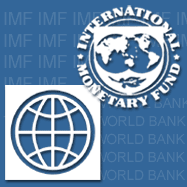Change of IMF and World Bank administrations to bring out new strategies
The United States is likely to place special emphasis on pursuing its “correct management” policy in poor countries

The top officials of the International Monetary Fund and the World Bank convened in Washington last weekend. The meetings indicated that both organizations were going through a turning point in their history. Undoubtedly, it has to do with the change of leadership in the IMF and World Bank. Last year Rodrigo de Rato became a new Managing Director of the IMF. Paul Wolfowitz will relieve James Wolfensohn at the helm of the World Bank on June 1st this year. But there is more in it than meets the eye. 
Everybody seems to be anticipating a new strategy that will follow the change of leadership in the World Bank. Mr. Wolfowitz will enable the Bush administration to use the World Bank for achieving goals that could not be achieved while Mr. Wolfensohn was in control. The United States is likely to place special emphasis on pursuing its “correct management” policy in poor countries. That policy may involve direct U.S. interference in the internal affairs of those countries. The Americans are trying to lobby similar political changes in the IMF. The number of IMF borrowers dropped dramatically over the last few years after the world economic situation improved. In actuality, only Argentina, Brazil, and Indonesia are receiving substantial financial aid from the IMF these days.
The IMF should work with “broad institutions” as opposed to the “narrow institutions” represented by financial system, taxation and banking supervisory authorities. The above concept mirrors the main idea generated by Rodrigo de Rato in the last six months. The term “broad institutions” implies such intersectoral factors of an economic situation as the judiciary and law-enforcement agencies. In other words, Mr. Rato suggests that corruption issues should be taken into account while implementing cooperation programs with foreign nations. No matter how reasonable this move may appear at first sight, it would entail interference in the internal affairs. The proposal of the IMF Managing Director met with unanimous opposition of the IMF shareholders.
Meanwhile, the IMF shareholders contributed to a new strategy development by putting forth a proposal that looks as reasonable as unrealistic at the same time. The statement released last Saturday by finance ministers and heads of central banks of the Group of Seven welcomes the creation of a new IMF instrument i.e. the agreement on policy monitoring for low-income countries that do not require lending by the IMF. The authors of the agreement were not specified in the statement though the concept was drawn up, without doubt, by U.S. administration. On the face of it, the idea makes sense. A country has to sign the IMF cooperation program to be entitled to bank loans from the World Bank. A non-financial agreement with the IMF could come in quite handy if a country does not need lending by the IMF while seeking financial aid from other international financial institutions. But it is really difficult to imagine any foreign government taking steps in line with the IMF recommendations with no financial backing.
Alexei Denisov
Subscribe to Pravda.Ru Telegram channel, Facebook, RSS!


